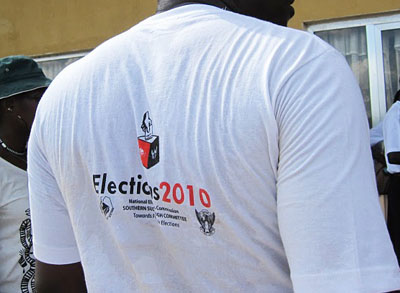
JUBA, Southern Sudan — “It’s come to my mind that it’s me who will apply what I’ve learned. It’s our citizens who will need to have a great knowledge in democratic principles in order to avoid confusion and conflict during the elections,” said Malual Joseph, a 22-year old civil society activist. Malual was one of about 25 participants in an Electoral Violence Prevention training workshop convened last week in Juba by the U.S. Institute of Peace and the Khartoum-based Institute for the Development of Civil Society. “As a trainer, I would like to help my people leave their differences aside to do their best for the welfare of a country,” Malual said on the last day of the workshop.
The USIP training brought together civil society organizers and community leaders from all over southern Sudan to learn skills that they will pass on to their communities in order to encourage the peaceful conduct of the April elections, Sudan’s first multi-party polls in 24 years. The training aimed to empower the participants with mediation and conflict resolution techniques and engage them in discussions on topics such as the role of the media during elections and lessons learned from the recent elections in Ghana, Kenya, and the Democratic Republic of Congo.
Jacki Wilson, a USIP senior program officer and one of the leaders of the training, said that one of the goals of the training was to encourage the idea that elections are “not a zero-sum game.” Instead, elections are part of a process of “democratic transformation” that fosters an inclusive, participatory environment that can be sustained over time. Moving away from the popular idea that elections are a high-stakes, politically and emotionally charged event is one way to reduce the likelihood that violence will break out during the electoral process or following the announcement of the results.
Unfortunately, the project of “democratic transformation” that formed the basis for Sudan’s 2005 Comprehensive Peace Agreement has arguably gone off the rails in Sudan. In the late stages of the “interim period” of the CPA, many of the provisions of the agreement that were intended to support this transformation process remain ignored or obstructed by one or both of the parties to the agreement. Malual is realistic about the serious challenges facing Sudan in the upcoming elections. Among the population, “illiteracy is a problem,” he said. “People have the right to cast their vote in a fair manner, and to be informed of what they can do.”
However, with the help of hardworking activists like Malual, who are devoting their time and energy to educating their fellow citizens, many Sudanese people are doing what they can to voice their opinions in what will undoubtedly be a long, uphill battle towards a more representative, inclusive, and dynamic political system in Sudan.

